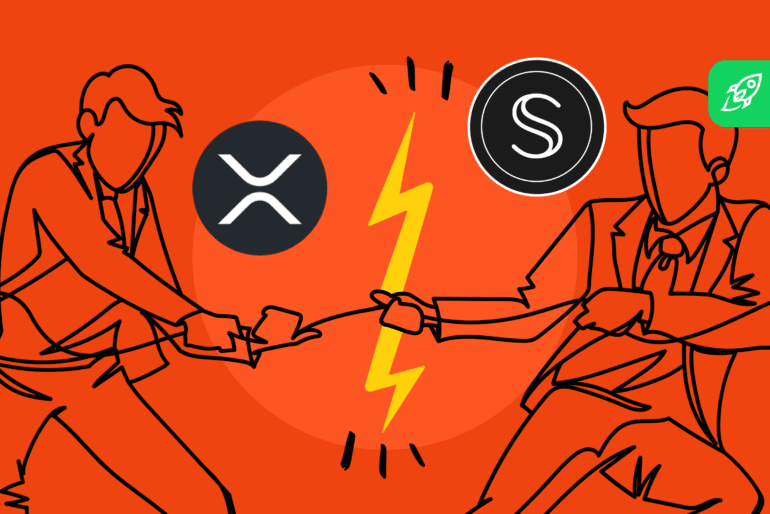XRP And The SEC: Ripple Lawsuit Update And Implications Of A Commodity Ruling

Table of Contents
The SEC's Case Against Ripple: A Summary of the Allegations
The SEC alleges that Ripple conducted an unregistered securities offering, violating federal securities laws. Their central claim is that XRP, Ripple's native cryptocurrency, functions as an unregistered security. The lawsuit, filed in December 2020, accuses Ripple of raising billions of dollars through the sale of XRP without registering it with the SEC. Key allegations include:
- Unregistered Securities Offering: The SEC argues that Ripple's sales of XRP constituted an ongoing unregistered securities offering.
- Defrauding Investors: The SEC claims that Ripple misled investors about XRP's value and its regulatory status.
- Violation of Federal Securities Laws: The core of the SEC's case rests on the violation of Section 5 of the Securities Act of 1933, which requires registration of securities offerings.
Key dates in the lawsuit include the initial filing in December 2020, various motions and filings by both parties, and the ongoing discovery process. The SEC's main points of evidence involve internal Ripple communications, sales records, and statements made by Ripple executives regarding XRP's value and potential.
Ripple's Defense and Counterarguments
Ripple vehemently denies the SEC's allegations, arguing that XRP is a digital currency or a commodity, not a security. Their defense strategy hinges on demonstrating that XRP doesn't meet the criteria of a security under the Howey Test (discussed below). Key elements of Ripple's defense include:
- Decentralized Nature of XRP: Ripple emphasizes that XRP operates on a decentralized, open-source network, unlike securities typically issued by a central entity.
- Functional Utility of XRP: Ripple highlights XRP's use in facilitating cross-border payments and other transactional functionalities, arguing it operates as a currency.
- Lack of Investment Contract: Ripple argues that there was no investment contract, a key element of the Howey Test, implying investors weren't expecting profits solely based on Ripple's efforts.
Ripple’s legal team cites various legal precedents and expert opinions to support their arguments, aiming to prove that XRP’s characteristics align more with established definitions of currencies or commodities rather than securities.
The "Howey Test" and its Relevance to the XRP Case
The Howey Test is a cornerstone of US securities law, used to determine whether an investment constitutes a security. The test involves four elements:
- An investment of money
- In a common enterprise
- With an expectation of profits
- Primarily from the efforts of others
The SEC argues that XRP satisfies all four elements of the Howey Test, pointing to the purchase of XRP with the expectation of price appreciation driven by Ripple's efforts. Ripple, conversely, contends that XRP fails to meet several of these criteria, arguing that investors primarily rely on market forces and not Ripple’s efforts to determine XRP’s value. The court's interpretation of the Howey Test in the context of XRP will be crucial in determining the outcome of the case.
Implications of a Commodity Ruling for XRP
A court ruling classifying XRP as a commodity would have significant implications. Potential positive consequences include:
- Increased Price and Trading Volume: Removal of SEC regulatory uncertainty could lead to a surge in investor confidence and trading activity.
- Greater Regulatory Clarity: A commodity classification would provide more clarity regarding XRP's regulatory status, potentially attracting institutional investment.
- Wider Adoption: Classification as a commodity could pave the way for broader adoption of XRP in various financial applications.
However, negative consequences are also possible:
- Limited Legal Protections: Commodities are generally subject to less stringent regulatory oversight compared to securities, potentially exposing investors to higher risk.
- Tax Implications: The tax treatment of commodities could differ from that of securities, potentially impacting investors.
Ultimately, a commodity ruling would significantly alter XRP's regulatory landscape, influencing its price, trading volume, and overall market position within the broader cryptocurrency ecosystem.
Potential Outcomes and Next Steps in the Ripple Lawsuit
Several possible outcomes exist for the Ripple lawsuit:
- Ruling in Favor of Ripple: A victory for Ripple could lead to the dismissal of the SEC's case, potentially boosting XRP's price and market confidence.
- Ruling in Favor of the SEC: An SEC victory could significantly harm XRP's value and potentially lead to Ripple facing substantial penalties.
- Settlement: A settlement between Ripple and the SEC is also possible, which could involve Ripple accepting certain conditions or restrictions.
The timeline for a final ruling remains uncertain, with potential for appeals extending the process. Further legal proceedings, including potential Supreme Court review, are also possible depending on the initial court decision.
Conclusion: The Future of XRP and the SEC's Regulatory Approach to Crypto
The "XRP and the SEC Lawsuit" is a pivotal case with far-reaching implications for the cryptocurrency industry. Understanding the SEC's arguments, Ripple's defense, and the potential outcomes is crucial for anyone involved in or interested in the crypto market. The court's decision on XRP's classification will set a precedent affecting future regulatory approaches to cryptocurrencies. Stay informed about further developments by following reputable financial news sources and legal updates regarding the case. Remember to consult with a qualified financial advisor before making any investment decisions concerning XRP or other cryptocurrencies.

Featured Posts
-
 Horrific Crash Video Captures Car Plowing Into Afterschool Program Multiple Fatalities
May 01, 2025
Horrific Crash Video Captures Car Plowing Into Afterschool Program Multiple Fatalities
May 01, 2025 -
 Rm 36 45 Juta Bantuan Asnaf Disalurkan Tabung Baitulmal Sarawak Sehingga Mac 2025
May 01, 2025
Rm 36 45 Juta Bantuan Asnaf Disalurkan Tabung Baitulmal Sarawak Sehingga Mac 2025
May 01, 2025 -
 Louisville Restaurants Plea For Support During River Road Closure
May 01, 2025
Louisville Restaurants Plea For Support During River Road Closure
May 01, 2025 -
 Canada Election 2024 Poilievres Conservative Party Faces Setback
May 01, 2025
Canada Election 2024 Poilievres Conservative Party Faces Setback
May 01, 2025 -
 Best Family Cruises 5 Top Rated Lines Reviewed
May 01, 2025
Best Family Cruises 5 Top Rated Lines Reviewed
May 01, 2025
